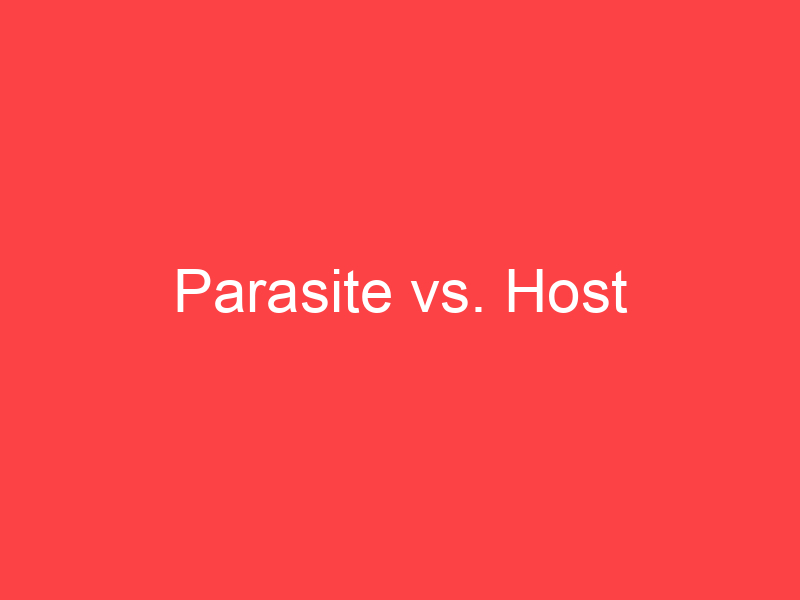-
Parasite
In biology, parasitism is a relationship between species, where one organism, the parasite, lives on or in another organism, the host, causing it some harm, and is adapted structurally to this way of life. The entomologist E. O. Wilson has characterised parasites as “predators that eat prey in units of less than one”. Parasites include protozoa such as the agents of malaria, sleeping sickness, and amoebic dysentery; animals such as hookworms, lice, and mosquitoes; plants such as mistletoe and dodder; and fungi such as honey fungus and ringworm. There are six major evolutionary strategies within parasitism, namely parasitic castrator, directly transmitted parasite, trophically transmitted parasite, vector-transmitted parasite, parasitoid, and micropredator.
Unlike predators, parasites, with the exception of parasitoids, typically do not kill their host, are generally much smaller than their host, and often live in or on their host for an extended period. Parasitism is a type of consumer-resource interaction. Parasites of animals show a high degree of specialization, and reproduce at a faster rate than their hosts. Classic examples include interactions between vertebrate hosts and tapeworms, flukes, the Plasmodium species, and fleas.
Parasites reduce host biological fitness by general or specialized pathology, from parasitic castration and impairment of secondary sex characteristics to modification of host behavior. Parasites increase their own fitness by exploiting hosts for resources necessary for their survival, in particular transmission. Although parasitism is often unambiguous, it is part of a spectrum of interactions between species, grading via parasitoidism into predation, through evolution into mutualism, and in some fungi, shading into being saprophytic.
People have known about parasites such as roundworms and tapeworms since ancient Egypt, Greece, and Rome. In Early Modern times, Antonie van Leeuwenhoek observed Giardia lamblia in his microscope in 1681, while Francesco Redi described endo- and ectoparasites including sheep liver fluke and ticks. Modern parasitology developed in the 19th century. In human culture, parasitism has negative connotations. These were exploited to satirical effect in Jonathan Swift’s 1733 poem “On Poetry: A Rhapsody”, comparing poets to hyperparasitical “vermin”. In fiction, Bram Stoker’s 1897 Gothic horror novel Dracula and its many later adaptations featured a blood-drinking parasite. Ridley Scott’s 1979 film Alien was one of many works of science fiction to feature a terrifying parasitic alien species.
-
Parasite (noun)
A person who lives on other people’s efforts or expense and gives little or nothing back. from 16th c.
-
Parasite (noun)
A sycophant or hanger-on.
-
Parasite (noun)
An organism that lives on or in another organism, deriving benefit from living on or in that other organism, while not contributing towards that other organism sufficiently to cover the cost to that other organism.
“Lice, fleas, ticks and mites are widely spread parasites.”
-
Parasite (noun)
A climbing plant which is supported by a wall, trellis etc. from 19th c.
-
Host (noun)
One which receives or entertains a guest, socially, commercially, or officially.
“A good host is always considerate of the guest’s needs.”
-
Host (noun)
One that provides a facility for an event.
-
Host (noun)
A person or organization responsible for running an event.
“Our company is host of the annual conference this year.”
-
Host (noun)
A moderator or master of ceremonies for a performance.
“The host was terrible, but the acts themselves were good.”
-
Host (noun)
Any computer attached to a network.
-
Host (noun)
A cell or organism which harbors another organism or biological entity, usually a parasite.
“Viruses depend on the host that they infect in order to be able to reproduce.”
-
Host (noun)
An organism bearing certain genetic material.
“The so-called junk DNA is known, so far, to provide no apparent benefit to its host.”
-
Host (noun)
A paid male companion offering conversation and in some cases sex, as in certain types of bar in Japan.
-
Host (noun)
A multitude of people arrayed as an army; used also in religious senses, as: Heavenly host (of angels)
-
Host (noun)
A large number of items; a large inventory.
“The dealer stocks a host of parts for my Model A.”
-
Host (noun)
The consecrated bread or wafer of the Eucharist.
-
Host (verb)
To perform the role of a host.
“Our company will host the annual conference this year.”
“I was terrible at hosting that show.”
“I’ll be hosting tonight. I hope I’m not terrible.”
-
Host (verb)
To lodge at an inn.
-
Host (verb)
To run software made available to a remote user or process.
“Kremvax hosts a variety of services.”

